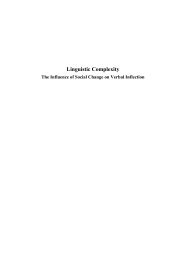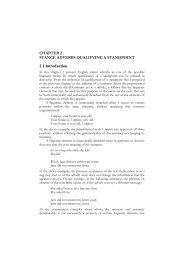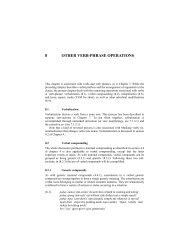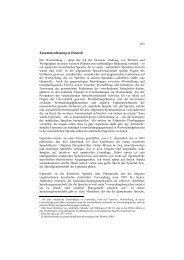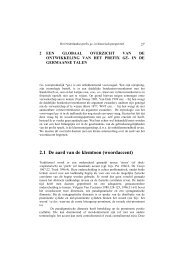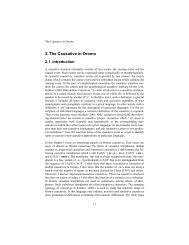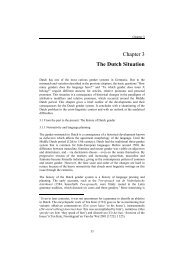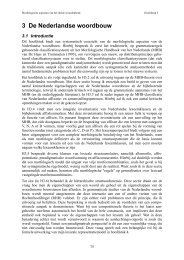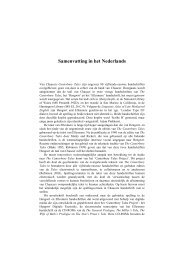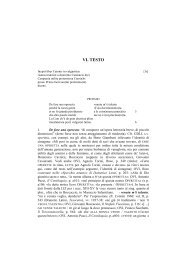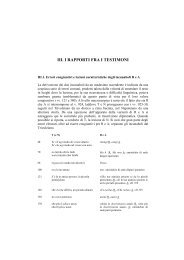Chapter 9 - LOT publications
Chapter 9 - LOT publications
Chapter 9 - LOT publications
You also want an ePaper? Increase the reach of your titles
YUMPU automatically turns print PDFs into web optimized ePapers that Google loves.
Accounts of SLI in Afrikaans<br />
(167e) Wat? *My/Ek jou verkul? Nooit nie!<br />
‘What? Me/I cheat on you? Never!’<br />
On the one hand, it would appear from (167) that Afrikaans differs from<br />
English in terms of default case. The default case in English is claimed to<br />
be accusative, but the same cannot be claimed for Afrikaans. On the<br />
other hand, Afrikaans also appears to differ from German, for which the<br />
default case is claimed to be nominative. As regards example (166a),<br />
Afrikaans and German are the same. However, Afrikaans resembles<br />
English and not German as regards constructions similar to that given in<br />
example (166b), as shown in (168). 159,160<br />
(168a) *Ek/My, my het hy geslaan<br />
‘I/Me, me he hit’<br />
(168b) *Sy/Haar, haar het hy gesien<br />
‘She/Her, her he saw’<br />
When considering the examples in (167) and (168), it appears that the<br />
default case in Afrikaans is not obviously either nominative or<br />
accusative. However, one could argue that the left-most ek/my in (168a)<br />
and sy/haar in (168b) are fronted, with the second instance being a<br />
repetition; i.e., the ek/my and sy/haar are not base-generated in a left<br />
peripheral topic position. 161 If this is the case, then the examples in (168)<br />
should receive less emphasis when considering default case than those in<br />
159 The Afrikaans equivalents of examples (166c-d) do not provide evidence as to the<br />
default case of Afrikaans: (166c) translates as Laat my jou liefling wees, where the secondperson<br />
pronoun will be jou regardless of its case. However, a sentence such as Laat ek<br />
jy/*jou wees en jy ek/*my ‘Let me be you and you be me’ clearly shows that predicate<br />
nominals bear nominative case in Afrikaans. In (166d), Afrikaans would not permit an<br />
article before the proper noun, and even if it did, the form of the article would be die,<br />
regardless of the case of the DP die Hans.<br />
160 As mentioned in note 158, it should be possible to have a contrastive left dislocated<br />
constituent with accusative case in German. Mich, mich hat er geschlagen ‘Me, me he hit’<br />
should therefore also be acceptable (similar to Mij, mij heeft ie geslagen being acceptable in<br />
Dutch). If this is the case, then Afrikaans resembles both English and German in this<br />
respect.<br />
161 Compare English wh-question constructions such as Who (yes) who did it?, Dutch ones<br />
such as Wie (ja) wie heeft het gedaan?, and Afrikaans ones such as Wie (ja) wie het dit gedoen?,<br />
where the left-most wh-element is not base-generated in this left-most position but is<br />
rather a repeated wh-element.<br />
256



